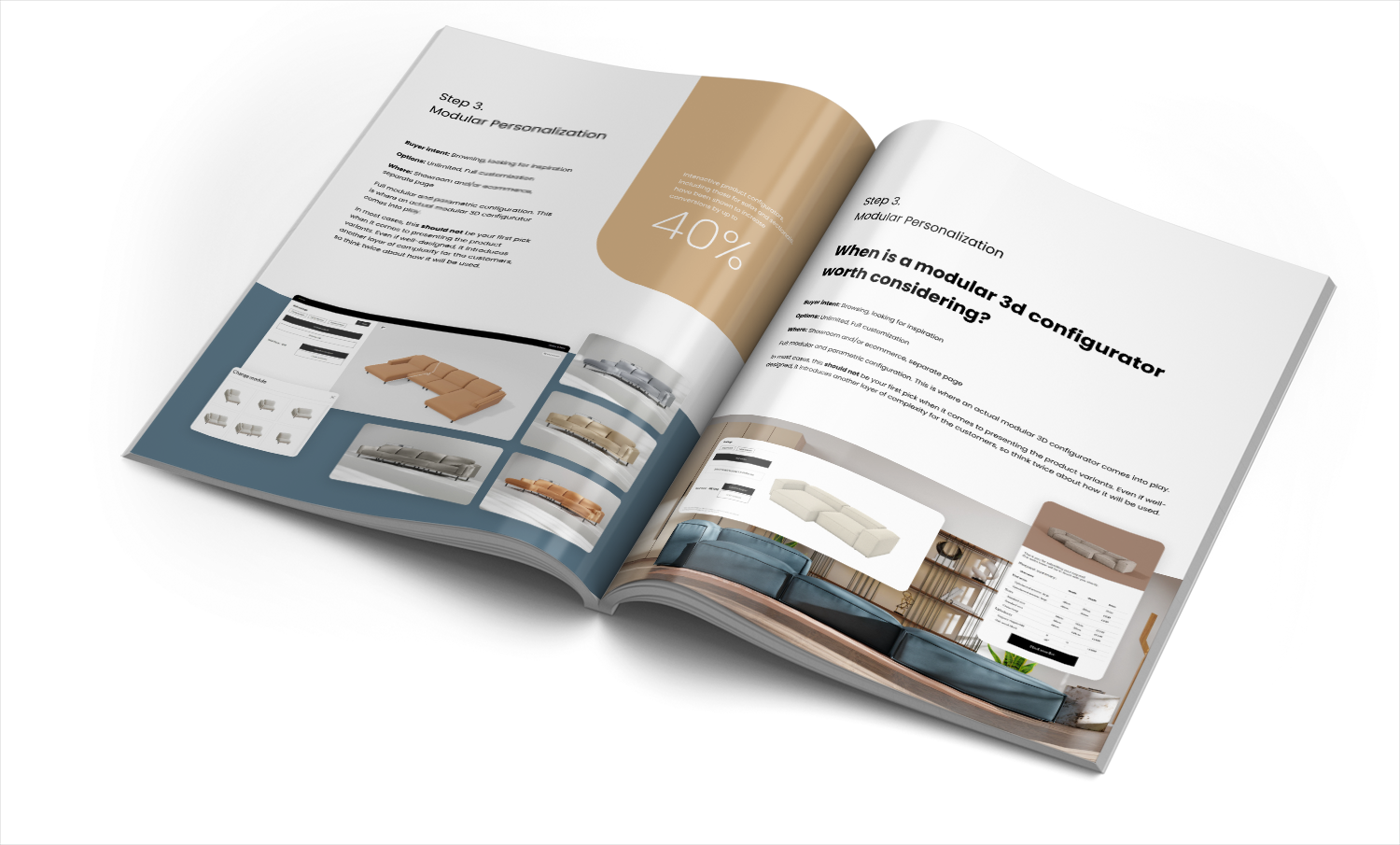The Ultimate 2025 Sofa Configuration Guide
Get your free copy todayy!

Content markdown with improved structure:
Content markdown: Switching to customizable, configurable product offerings opens up growth opportunities—but also brings fresh logistical headaches. Chief among them: customers expect to know not just how their perfect sofa will look, but exactly when it will arrive. Hiding or generalizing estimated delivery dates during configuration is a surefire way to lose both sales and trust.
Here’s how integrating configuration-based delivery estimates into your sales process directly tackles some of the biggest pain points in custom furniture shopping, and why your configurator needs this feature if you care about customer experience—and conversion.
Imagine a customer spends 20 minutes designing a modular sofa, loving every tweak, only to discover at checkout that shipping will take 12 weeks—or, worse, no clear estimate is shown at all. Lack of upfront clarity on lead times is a top driver of abandoned carts in customizable furniture ecommerce.
Embedding live, configuration-specific delivery estimates within the configurator itself bridges this uncertainty gap. As the customer picks a rare wood finish or a fabric that’s low in stock, the system instantly updates the estimated delivery window (“Ships in 2 weeks” or “Available in August”), letting users make informed choices. This transparency empowers buyers, reduces last-minute frustration, and can even nudge them toward faster-shipping alternatives.
One client added real-time lead times directly into the material selector of their sofa configurator. Result: users started gravitating toward in-stock options, significantly reducing the frequency and cost of post-order edits, cancellations, and customer support calls. This kind of operational efficiency and user guidance is discussed in detail in our article on how a configurator helps reduce returns or incorrect orders.
Customization creates operational complexity. Without a precise sync between the configurator and your ERP/inventory systems, sales reps may promise delivery dates that production can’t meet, eroding trust and costing time.
Modern 3D configurators can be integrated with live inventory and production scheduling tools. This means every change a customer makes—whether it’s module layout, fabric, or accessory—triggers a real-time check of material availability and factory schedules before finalizing estimated delivery. The advantage: sales stays honest, operations stay efficient, and “what you see is what you get” becomes a reality.
This close integration with ERP systems is critical and has been addressed comprehensively in our post about how a configurator integrates with ERP systems, where we emphasize the importance of synchronized data flows to maintain order and production accuracy.
| Pain Point | Manual/Generic Process | Configurator-Based Delivery Estimates |
|---|---|---|
| Delivery Transparency | Broad range (6–14 weeks) | Specific by selection (e.g. 2 or 8 weeks) |
| Risk of Order Errors | High: changes after payment | Low: info confirmed pre-purchase |
| Customer Support Burden | High: many “Where’s my order?” calls | Lower: fewer post-purchase surprises |
| Conversion Rate | Often suffers at checkout | Higher: purchase confidence |
| Upsell Potential | Minimal | Strong: "ship faster" material prompts |
The upsell opportunities enabled by transparent delivery estimates tie closely with insights in our blog on how a configurator helps upsell or bundle products, where showing alternatives can guide customer decisions beneficially.
In the crowded furniture market, differentiation can’t be just about product visuals. Customers crave brands that remove anxiety from big-ticket buying decisions. Perceived delivery uncertainties undermine trust faster than slow websites or bad photography.
Configurator-based delivery estimates become a trust-building cornerstone. Shoppers see you’re not just selling a dream; you’re delivering a commitment. Clear lead times, even if long, signal operational maturity and help set realistic expectations, reducing post-sale conflict and churn.
Brands who provided full delivery transparency through their configuration tool saw an uptick in repeat business and organic referrals. Customers appreciated not having to “guess” or call for updates, leading to higher satisfaction scores and lower acquisition costs. This effect on trust and perceived quality is discussed further in our article about how visualization affects trust and perceived quality.
Disconnected digital experiences force buyers to jump channels, collect screenshots, and repeatedly confirm order details—slowing down deals and inviting errors.
When your configurator displays all critical details—visualization, price, dimensions, AND delivery date—you keep momentum. Whether online, in-store, or via emailed PDF quote, everyone operates from the same, accurate source of truth.
Allow customers and sales reps to generate shareable quotes with every variable—final look, AR preview, price, and guaranteed delivery window—at a single click. This smooths the transition from inspiration to production, with fewer missteps and costly handovers. The value of such PDF outputs and shareable documents is elaborated in our post on should I send the customer a PDF of their design after the session.
Your customers don’t just want furniture—they want certainty, speed, and honesty. Painting clear, configuration-driven delivery estimates directly into your product configurator delivers on all three counts. It transforms what was once a friction point into a sales asset, increases operational control, and grows trust that lasts beyond the first transaction.
Ready to make delivery transparency your competitive edge? Schedule a free 30-minute consultation with our configuration specialists—we’ll assess your current flow and show you actionable steps that visualize every promise you make, from material selection to final mile.
For those interested in broader sales and operational optimization with configurators, further explore topics like how to use speed and clarity as a competitive edge and how a configurator shortens the sales cycle to fully leverage the potential of these digital tools in furniture sales.